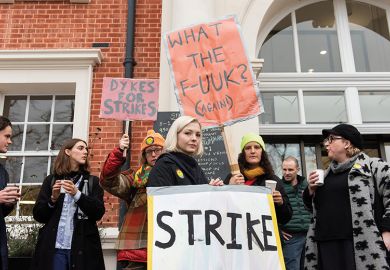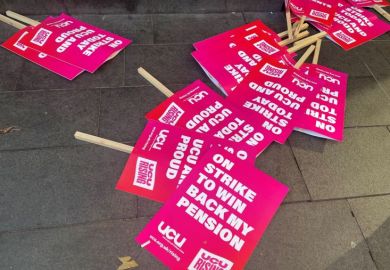Universities are seeking a review of increased contribution rates proposed by UK higher education’s biggest pension fund and have expressed concerns about the role of The Pensions Regulator (TPR) in the process.
In a valuation report published on 3 March, the Universities Superannuation Scheme said that contributions from employers and staff would need to rise from the current 30.7 per cent of salaries to between 42.1 per cent and 56.2 per cent in order to protect benefits.
The announcement left the UK sector facing a fresh round of industrial unrest on pensions, following a series of strikes in recent years.
However, in a letter to the USS published on 10 March, Universities UK – which represents about 340 employers in the scheme – warns that the planned contribution rates “are unaffordable for employers and will risk pricing even more staff out of the scheme”.
Requesting a formal review of the proposals, UUK says that the USS appears to take “very little account” of evidence submitted by universities and unions, and expresses concern about the fund’s “clear implication that all employers need to do is to provide further covenant support, and that if employers do not provide this then employees need only blame employers”.
“There is no clear justification for why the covenant requests have such a material impact on the contributions requested, and the scenarios seem staged to drive employers to provide even more additional support,” the letter says.
“We find this pitting of stakeholders against each other to be unhelpful and opportunistic given market conditions.”
The letter adds that some of the USS’ decision-making “looks odd to employers”, including the “extent of the influence” of The Pensions Regulator on the process. “The potential contribution levels being discussed in detail before Christmas were very different from those published following the period of intensive USS trustee discussions with TPR,” the letter says.
“These perceptions erode trust in the process and make agreement across the stakeholders harder to achieve.”
In a separate letter to the regulator, UUK says it is “vital” that the regulator should “allow the stakeholders enough space to find a solution – rather than imposing any hard constraints ahead of stakeholder discussions and consultation”.
“We have seen little evidence to date that there is focus on your statutory objective of minimising any adverse impact on the sustainable growth of employers,” UUK chief executive Alistair Jarvis tells Mike Birch, director of supervision at the regulator.
“In particular, if the new pricing leads to widescale industrial action (as opposed to leaving room for a negotiated settlement), then the practical consequence of TPR’s input may well be seen to cause what we believe would be unnecessary damage to employers.”
The UUK letter to USS adds that universities would be keen to discuss the possibility of reducing guaranteed defined benefit (DB) accrual, while maintaining the scheme’s hybrid structure, which also includes defined contribution payouts.
“It is our understanding that if the amount of DB risk building up over time were reduced, and hence less reliance on covenant (all else being equal) particularly over longer periods, this could suggest an alternative path where the level of prudence is adjusted to reflect the benefit change which would be implemented, making the costs more affordable to employers and members,” the letter says.
“We understand that the principle of such an approach would be supported by TPR. With some relaxation of assumptions, a solution would be more achievable that allows for current contributions and a continued hybrid benefit structure, supported by a package of additional covenant support, that would be both affordable and meaningful.”
A USS spokeswoman reiterated that “material changes to benefits and further covenant support from employers will need to be agreed if we are to avoid significant further increases in contributions, beyond levels the sector would find acceptable”.
“We are highly sympathetic to the challenges facing our stakeholders, and we will work with them closely as they confront the decisions that need to be made,” she said.
The deficit of the USS fund, which has about 400,000 active and retired members, is now estimated to stand at between £14.9 billion and £17.9 billion.
Register to continue
Why register?
- Registration is free and only takes a moment
- Once registered, you can read 3 articles a month
- Sign up for our newsletter
Subscribe
Or subscribe for unlimited access to:
- Unlimited access to news, views, insights & reviews
- Digital editions
- Digital access to THE’s university and college rankings analysis
Already registered or a current subscriber? Login








